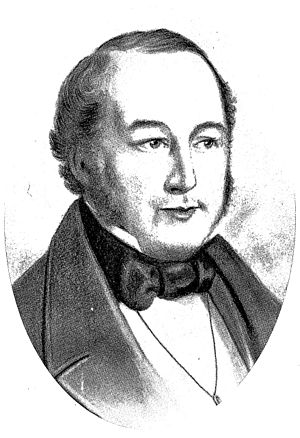George Fletcher Moore facts for kids
George Fletcher Moore (born 1798, died 1886) was an important early settler in Western Australia. He was known for exploring new areas and for writing one of the first books about the language of the Aboriginal people in the Perth area. He also wrote a famous book called Diary of Ten Years Eventful Life of an Early Settler in Western Australia.
Contents
Early Life and Education
George Fletcher Moore was born in Ireland in 1798. He went to school at Foyle College and then studied law at Trinity College Dublin. He became a lawyer in 1820. After working as a lawyer for six years, he decided to look for a job as a judge in a new colony. He wanted to go to the Swan River Colony in Western Australia.
Life in Australia
Moore arrived in the Swan River Colony on October 30, 1830. He found out that someone else had already been given the judge's job he wanted. So, he decided to focus on getting his own land and starting a farm. He claimed a large area of land in the Avon Valley. He also got part of another person's land in Upper Swan.
Exploring New Lands
In September 1831, Moore joined a group led by Robert Dale to cut a road to the Avon Valley. This was his first time seeing his land. While there, Moore and Dale explored the Avon River. They correctly guessed that the Avon River and the Swan River were actually the same river. The information he learned helped him choose better land for his farm.
In February 1832, Moore finally got a job as a judge. With good land and a regular salary, he became a successful farmer. By 1833, he owned one of the largest groups of sheep in the colony.
Learning from Indigenous Australians
Moore was different from many other settlers because he became good friends with the Indigenous Australians in the area. He became very interested in their culture, language, and customs. In 1833, he wrote the first public report about the customs of the Aboriginal people in the Perth Gazette newspaper.
He believed that Aboriginal people should be paid for the land they lost. He also thought they should learn about Christianity. For a while, he helped fund Robert Lyon to learn their language. Then, Moore decided to learn it himself.
More Explorations and Discoveries
Between 1834 and 1836, Moore went on several exploring trips.
- In January 1834, he explored the Swan River and confirmed it was connected to the Avon River.
- In April 1835, he found new land for farming near the Garban River. This river was later renamed the Moore River.
- In March 1836, he explored the land between the Moore River and the northern part of the Avon River.
- In October 1836, he joined an expedition with John Septimus Roe. They explored inland hoping to find a large inland sea, but instead found very dry land.
Public Role and Dictionary Work
In 1834, some of Moore's letters to his family in England were published as a book. It was called Extracts from the Letters and Journals of George Fletcher Moore Esq..
Later that year, Moore's job as a judge changed. He became the Advocate-General. This new job gave him a seat on the colony's Legislative Council, which meant he had a lot of influence. Moore sometimes disagreed with the Governor's policies, especially about creating a police force to deal with Aboriginal people.
When John Hutt became governor in 1839, he shared Moore's interest in the Aboriginal language. They started working together to create a dictionary of the Aboriginal language. By August 1840, the dictionary was almost finished. In 1842, Moore's dictionary was published. It was titled A Descriptive Vocabulary of the Language in Common Use Amongst the Aborigines of Western Australia.
Moore returned to Western Australia in 1843 during a difficult economic time. He became less popular because he disagreed with ideas to help landowners who were struggling. He believed their problems were their own fault. However, he still had the trust of the governors, John Hutt and Andrew Clarke.
On October 29, 1846, Moore married Fanny, who was Governor Clarke's stepdaughter. Because of his connection to the Governor, Moore was appointed acting Colonial Secretary in November 1846 when the actual secretary and the Governor were very ill. He continued in this role until March 1848.
Under the next acting governor, Frederick Irwin, Moore's popularity continued to decline. The government was not well-liked by the colonists. When new officials arrived, Moore lost most of his influence.
Later Life and Death
In 1852, Moore left Western Australia and returned to Ireland. He said he was visiting his sick father, but he was also worried about his wife's health. His wife's condition worsened in Ireland, and she refused to return to Western Australia. Moore had to give up his job and was not given a pension. Fanny Moore died in 1863, but Moore never returned to Australia.
Around 1878, the editor of The West Australian newspaper, Sir Thomas Cockburn Campbell, asked to publish Moore's old letters. The letters appeared in the newspaper in 1881 and 1882. After seeing them in print, Moore decided to publish them as a book. They were published in 1884 as Diary of Ten Years Eventful Life of an Early Settler in Western Australia.
George Fletcher Moore died in his London apartment on December 30, 1886.
Images for kids
 | Delilah Pierce |
 | Gordon Parks |
 | Augusta Savage |
 | Charles Ethan Porter |



